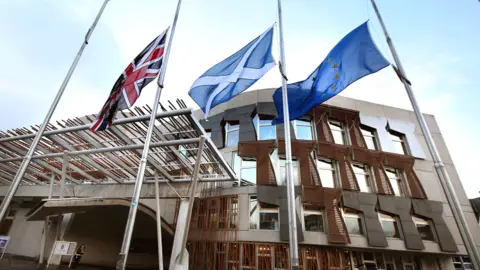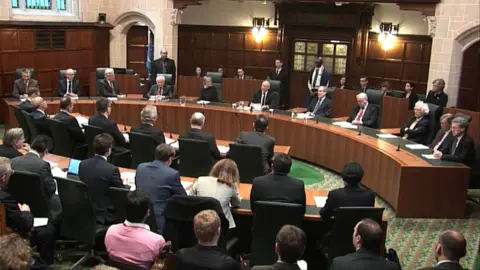No, Holyrood cannot 'veto' or 'block' Brexit
 PA
PADoes Holyrood have a power of veto over the Great Repeal Bill? Could the Scottish Parliament block Brexit? Bluntly, no.
The issue arises once more because there is discourse again over the prospect that the Brexit bill might require an accompanying Legislative Consent Motion (LCM) at Holyrood.
That is because departing from the European Union impinges upon powers - such as justice and agriculture - which are devolved to Edinburgh.
In the Commons today, the new Leader of the House, Andrea Leadsom, confirmed that the prospect of an LCM was under active consideration by the UK government.
In the Scottish Parliament today, the First Minister Nicola Sturgeon said it was "unthinkable" for Holyrood and the Scottish Government to be sidelined. She urged a unity of purpose among MSPs.
Now, it seems at the very least highly likely that an LCM would be appropriate. It is not just that Scotland has devolved powers. It is what those powers entail - including, in the justice arena, a distinct and separate Scottish legal system, with a canon of ancient and contemporary Scots Law.
Devolved implications
But back to the opening question. Does an LCM amount to a veto? I think not, for three principal reasons.
One, we have had this discussion previously and Scottish Ministers have never at any point claimed they had a potential veto over Brexit.
Two, it could be argued that an LCM would cover those parts of the Great Repeal Bill which involve devolved provisions. It would not, of itself, be a vote upon the entire substance of the Bill but upon the devolved implications.
Thus it would be designed to plug any unwanted gaps in Scots Law which might result if the return of EU powers did not feature the Scottish dimension. In short, to help Holyrood, not hinder Westminster.

Three, and most saliently, we already have a legal ruling on this matter. The Legislative Consent Motion builds upon the original Sewel Convention, named after the Labour peer and minister who steered the original devolution legislation through the House of Lords.
In January, the UK Supreme Court ruled on the procedures required in order to trigger Article 50, the formal notice that the UK intended to leave the EU.
Inter alia, the Court ruled that the Sewel Convention was just that: a convention. It was not justiciable. It was not legally enforceable. It had no statutory force.
This confirmed the intrinsic power structure in the UK. Westminster is and remains sovereign. MPs can legislate as they choose - including in devolved areas. That was made plain when the Scottish Parliament was established and remains germane today.
So the UK government could go ahead and invite MPs to implement the Great Repeal Bill, including in devolved areas, whatever MSPs say.
Political implications
That is the story. But it is not the whole story. The UK government, particularly in its weakened state, will not want to roll over the devolved parliament. It could, legally. But it will not want to, politically.
As the Queen said in the Gracious Speech, her UK ministers will want to proceed by building consensus with others - including the devolved administrations.
So where might this go? The Scottish Secretary David Mundell has already signalled that he is ready for an LCM to be required with regard to the Great Repeal Bill. (There would be distinct decisions to be taken with regard to the other seven Brexit Bills, dealing with individual issues).
UK government sources indicate they are reasonably confident that a deal can be done with the devolved administrations. That would not be, they say, endorsing the principle of Brexit - but consenting, in the event of Brexit, to a legislatively tidy and sensible implementation.
Might Nicola Sturgeon deal? I think she might. Scottish government sources indicate they would be much more inclined to consent to the Bill if they were granted a real role in the Brexit negotiations themselves.
It was no accident, therefore, that Ms Sturgeon listed two items together in one sentence today: the demand for Holyrood to have a legislative role in Brexit and the demand for the Scottish government to have a say in the talks.
Ideally, the Scottish government would like to be at the top table throughout for the Brexit negotiations with the European Commission. But that might well be far too much for UK ministers who have tended to stress that it is up to the UK, as member state, to negotiate exit from the EU.
Further, it might not be wholly acceptable to the EU Commission who will find it tricky enough to deal with UK ministers without encompassing a kaleidoscopic mix.
But SG sources ponder whether a compromise might be possible. For the devolved administrations to have a significant role in the wider UK negotiation team with, perhaps, an occasional place in the talks themselves when, for example, justice provisions are being discussed.
We shall see. Alongside that issue is the question of powers. Nicola Sturgeon says that devolved matters like agriculture and fisheries should come straight back from Brussels to Edinburgh, with no stop in a London lay-by on the way.
UK ministers say the priority is an orderly return of powers to the member state from the EU. After that, powers can be redistributed across the UK.
On agriculture and fish, for example, they seem to favour a UK form of the common policies which presently govern such matters across the EU. Scottish ministers say devolve first, set up common structure second.
More talking to come, then. Much more.
